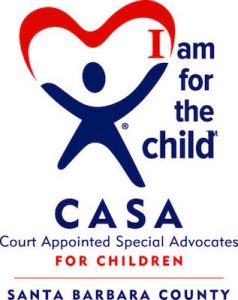 “When I started I expected nothing for myself,” said Doris Becker, recalling her ten years as a volunteer CASA (Court Appointed Special Advocate), working on behalf of children who are involved in the court system. The program was just starting out in Santa Barbara County when she saw a newspaper ad about the training classes.
“When I started I expected nothing for myself,” said Doris Becker, recalling her ten years as a volunteer CASA (Court Appointed Special Advocate), working on behalf of children who are involved in the court system. The program was just starting out in Santa Barbara County when she saw a newspaper ad about the training classes.
“I thought, I love children and I want to volunteer. At the time I didn’t know what the program was. I just really wanted to help.”
Not only has she helped by devoting countless hours to advocating on behalf of her young charges, about four years ago she also got her husband Don into the act.
Don, who also serves on the Board of Directors of Hillside House, said he got involved for two reasons. “It was a good project, but there’s a confidentiality issue and she would come home and want to talk (about her cases).”
As a pharmacist (now retired), Don was used to dealing with confidentiality issues, and decided to become a CASA to help support his wife in her work. While the work is certainly rewarding, both of the Beckers admitted that it can also be emotionally grueling.
“The emotional ups and downs have caused me sleepless nights, so you have to love children,” said Doris. “And you do question yourself; especially if Social Services and you are not pulling in the same direction. Then you go, do I really know what is best for the child?”
You wonder, what do they see that I don’t see, said Don. “There’s some self doubt in there.”
“And then when the judge goes with your recommendation you come out and you should be very excited and you go oh my God, I’m now responsible for what is happening to this little guy, so it is emotional and yeah, you have to really see if you can be totally unbiased, can you really look at it objectively, you know,” said Doris.
Unlike social workers who have enormous case loads and generally try when possible to keep families together, CASAs make their recommendations strictly based on their view of what is best for the child. They evaluate the situation at school when applicable, and at the child’s home, which is often a foster care situation. They also make sure that the children are taken to the doctor for regular checkups.
While situations and needs vary with each case, the Beckers said they try to see their current charge (a little girl) at least once a week.
“She loves the zoo, she loves the ocean. We took her one morning for three hours up and down the ocean. We were both totally worn out,” said Doris, laughing.
“If it is a good situation you might not even see the child every week,” she said, recalling one of her cases, two elementary school age boys who were brothers. “They were so involved in school and other activities that we would have not done any good, we would have been interfering. We would have been disruptive rather than be helpful.”
In the case of another child whose mother had drug problems and was frequently homeless, “I would sometimes see him four or five times a week because he was, at one point, so, so needy — he would be alone. His mom was put away and his sister was moved, so the only person he knew was me,” said Doris.
The children aren’t allowed to come to the volunteers’ homes, so sometimes planning activities can be challenging. CASAs meet regularly with their caseworkers and fellow CASAs who are working with children in the same age group, and often exchange ideas for activities.
Free bowling at Zodo’s in the summer was a big one, as are the various free days at local museums and attractions.
“We have one car that’s our CASA car,” said Don. It’s full of skateboards, kneepads, scooters, helmets, beach toys and more. The Becker’s son, now grown and living in New York City with a family of his own, even gets into the act, sending boxes of books, games, toys and goodies for the children his parents look out for.
One of the most frequently asked questions about the CASA program, is, “Where do you find the time?”
“That always comes up,” said Don. “You find the time, you make yourself find the time.”_”And I’m just amazed how much pleasure we are also getting out of this,” said Doris.
For more information about volunteering to be a Court Appointed Special Advocate, call 879.1735, E-mail info@sbcasa.org or visit www.sbcasa.org.
Originally published in the Goleta Valley Voice in October, 2005.
